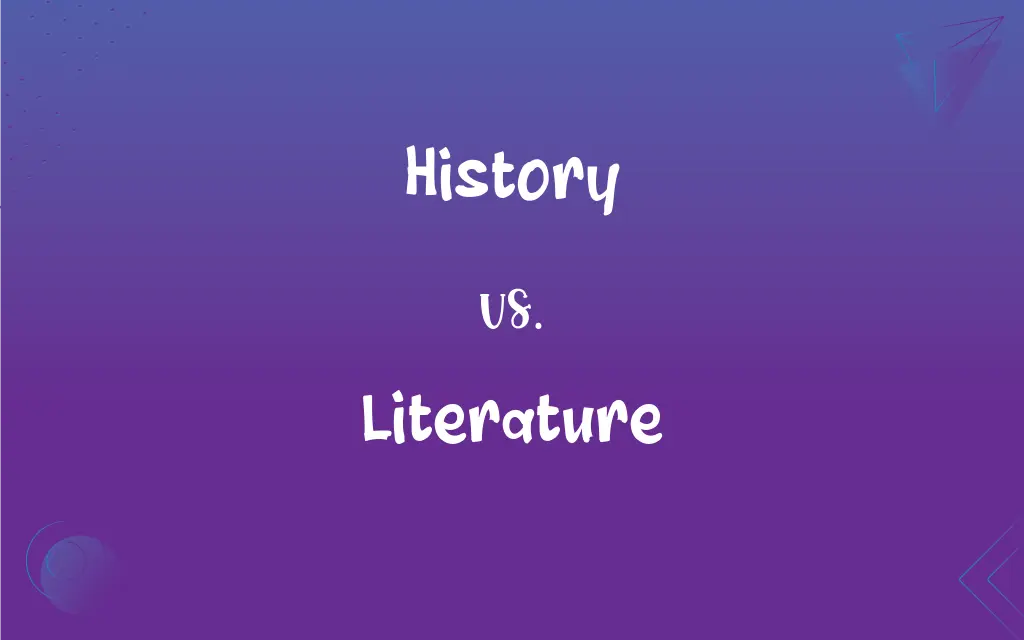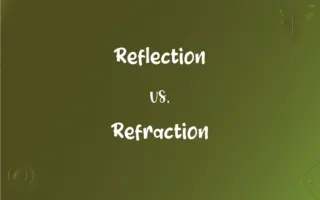History vs. Literature: What's the Difference?
Edited by Aimie Carlson || By Harlon Moss || Updated on October 3, 2023
History is the factual account of past events, while literature is imaginative writings or the art of written works.

Key Differences
History refers to the chronological record of past events, particularly the events concerning humanity. This record often stems from thorough research, analysis, and documentation. Literature, on the other hand, pertains to written artistic expressions, which can encompass both factual and fictional narratives. History is rooted in objective truths, whereas literature explores subjective experiences and emotions.
In history, the focus is often on dates, events, and figures. The narrative is typically centered around real occurrences and their implications. Literature may take inspiration from these real events, but it delves deeper into the human psyche, emotions, and relationships. Literature, therefore, can be a blend of reality and imagination, offering a perspective not bound by factual constraints.
The sources for history are primary documents, eyewitness accounts, and other tangible evidences. Historians strive to maintain objectivity, aiming to represent the past as accurately as possible. In literature, the sources are the creativity and imagination of the writer. While it can be influenced by historical events, literature primarily revolves around characters, plot, and themes, which may or may not be based in reality.
While history teaches us about the past and the evolution of societies, cultures, and civilizations, literature offers insight into the human experience. Through literature, we can understand emotions, motivations, and the deeper aspects of human nature. Both history and literature are crucial in shaping our understanding of the world, with history providing context and literature adding depth.
Comparison Chart
Nature
Factual
Imaginative
ADVERTISEMENT
Source of Information
Primary documents, eyewitness accounts
Author's creativity and imagination
Main Focus
Dates, events, figures
Characters, plot, themes
Purpose
Record and interpret past events
Explore human experiences and emotions
Constraints
Bound by factual accuracy
Not necessarily bound by reality
History and Literature Definitions
History
Past events forming the background of a particular place, institution, or field.
The history of jazz music is rich and diverse.
ADVERTISEMENT
Literature
Written works, especially those with artistic value.
Shakespeare's plays are a vital part of English literature.
History
A study of past events, particularly human affairs.
She's majoring in history at the university.
Literature
The body of written or printed works on a particular subject.
The library has extensive literature on botany.
History
A chronological record of past events.
The history of ancient civilizations is fascinating.
Literature
The profession of a writer or author.
She aspired to make her mark in literature.
History
A continuous record of important or public events.
The news channel covered the history of the conflict.
Literature
Written or printed matter of any kind.
The company's promotional literature describes their services.
History
Past events as related to a particular subject or theme.
The history of medicine has seen many breakthroughs.
Literature
The aggregate of written works in which expression and form are characteristic of genuine art.
World literature offers a window into diverse cultures and experiences.
History
A formal written account of related natural phenomena
A history of volcanoes.
Literature
The body of written work produced by scholars or researchers in a given field
Medical literature.
History
A record of a patient's general medical background
Took the patient's history.
Literature
The body of written works of a language, period, or culture.
History
An established condition or pattern of behavior
An inmate with a history of mental illness and drug abuse.
Literature
Imaginative or creative writing, especially of recognized artistic value
"Literature must be an analysis of experience and a synthesis of the findings into a unity" (Rebecca West).
History
A chronological record of events, as of the life or development of a people or institution, often including an explanation of or commentary on those events
A history of the Vikings.
Literature
The art or occupation of a literary writer.
FAQs
How is authenticity ensured in history?
Historians use primary sources, evidence, and thorough research to ensure factual accuracy.
What is the primary difference between history and literature?
History is the factual account of past events, while literature is imaginative writings or artistic expression.
Why are both history and literature essential in education?
While history provides context and understanding of our past, literature fosters empathy, creativity, and critical thinking.
Why study history?
Studying history offers insights into past events, societal evolution, and helps prevent past mistakes.
Can history change?
Interpretations of history can change, but the factual events that occurred remain constant.
What is a major challenge in studying history?
Ensuring objective interpretation and avoiding present-day biases while analyzing past events.
Do all historical accounts count as history?
Not necessarily. While historical fiction can be based on real events, it's categorized under literature due to its imaginative elements.
Why is literature important in understanding human experiences?
Literature delves into emotions, relationships, and human psyche, offering perspectives not bound by factual constraints.
How do we differentiate historical fact from fiction in literature?
Research, cross-referencing with historical records, and discerning the intent of the author can help differentiate fact from fiction.
What role does literature play in culture?
Literature reflects, shapes, and often challenges cultural norms, values, and beliefs.
Can historical texts be considered literature?
Yes, if they are written with artistic flair and expressiveness, they can be categorized under literature.
How do history and literature intersect?
Literature can reflect historical contexts, and history can provide backgrounds for literary plots.
What's a primary difference in sources for history vs. literature?
History relies on primary documents and evidences, while literature springs from the author's creativity.
How can history influence literature?
Historical contexts, events, or figures can provide backgrounds, plotlines, or themes for literary works.
Can literature influence how history is viewed?
Yes, literature can shape perceptions and interpretations of historical events.
Can literature be based on history?
Yes, many literary works are historically based or inspired, though they may take artistic liberties.
Why are some historical events depicted differently in literature?
Literary works may take artistic liberties for thematic depth, character development, or narrative cohesion.
Why do some literary works become part of the canon of "classic literature"?
Their enduring themes, stylistic excellence, and cultural impact often secure their place in classic literature.
Is oral history as valid as written history?
Oral history offers valuable insights but may be prone to alterations over time; verification with written sources is beneficial.
Are biographies and autobiographies history or literature?
They can be both. While rooted in factual events (history), their narrative style might classify them as literature.
About Author
Written by
Harlon MossHarlon is a seasoned quality moderator and accomplished content writer for Difference Wiki. An alumnus of the prestigious University of California, he earned his degree in Computer Science. Leveraging his academic background, Harlon brings a meticulous and informed perspective to his work, ensuring content accuracy and excellence.
Edited by
Aimie CarlsonAimie Carlson, holding a master's degree in English literature, is a fervent English language enthusiast. She lends her writing talents to Difference Wiki, a prominent website that specializes in comparisons, offering readers insightful analyses that both captivate and inform.































































